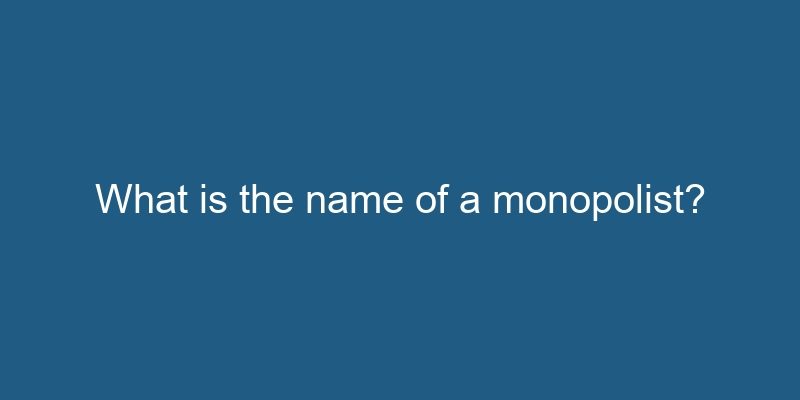A monopolist is an individual or entity that has exclusive control over the supply of a product or service in a particular market, resulting in the ability to control prices and exclude competition. In economic terms, a monopolist has a monopoly, which is a market structure characterized by a lack of competition.
- The Definition of a Monopolist
- Types of Monopolies
- 1. Natural Monopoly
- 2. Government Monopoly
- 3. Technological Monopoly
- 4. Geographic Monopoly
- The Name of a Monopolist
- Effects of Monopolies
- 1. Higher Prices
- 2. Reduced Consumer Choice
- 3. Inefficient Allocation of Resources
- 4. Barriers to Entry
- Government Regulation and Monopolies
- Conclusion
The Definition of a Monopolist
A monopolist is often defined as a single seller in a market, but this definition is not entirely accurate. In reality, a monopolist can be an individual, a corporation, or even a government entity. The key characteristic of a monopolist is the absence of competition, allowing them to dictate prices and exert significant control over the market.
Types of Monopolies
There are different types of monopolies, each with its own characteristics and implications. Let’s explore some of the common types:
1. Natural Monopoly
A natural monopoly occurs when a single firm can meet the entire market demand at a lower cost than multiple competing firms. This is often seen in industries with high fixed costs, such as utilities like water, electricity, or natural gas. The infrastructure required to provide these services, such as pipelines or power grids, is expensive to duplicate, making it more efficient for a single company to handle the entire market.
2. Government Monopoly
A government monopoly is when a government entity has exclusive control over the supply of a particular product or service. This can include areas such as defense, postal services, or public transportation. Governments may establish monopolies to ensure the provision of essential services or to maintain control over sensitive industries.
3. Technological Monopoly
A technological monopoly arises when a firm gains exclusive control over a particular technology or intellectual property. This can occur through patents, copyrights, or trade secrets. Examples include pharmaceutical companies that hold patents for life-saving drugs or technology companies that develop proprietary software.
4. Geographic Monopoly
A geographic monopoly exists when a single firm dominates a particular geographic region. This can occur due to factors such as limited access to resources, high transportation costs, or barriers to entry. An example of a geographic monopoly is a local utility company that has exclusive control over providing electricity to a specific area.
The Name of a Monopolist
While there is no specific term to refer to a monopolist, the term “monopolist” itself can be used to describe an individual or entity that holds a monopoly. However, it is important to note that the term “monopolist” is a generic description and does not refer to a specific person’s name.
In some cases, if a company dominates a particular market to the extent that it becomes synonymous with the industry itself, the company’s name may be used to refer to the monopolist. For example, “Google” is often used to describe the dominant player in the search engine market.
Effects of Monopolies
Monopolies can have significant effects on markets, consumers, and the economy as a whole. Let’s explore some of the key effects:
1. Higher Prices
One of the main consequences of a monopoly is the ability to set higher prices. Without competition, monopolists can charge higher prices for their products or services, reducing consumer surplus and potentially leading to economic inefficiencies.
2. Reduced Consumer Choice
Monopolies often limit consumer choice by offering a single product or service. This lack of variety can be detrimental to consumer welfare as it restricts options and stifles innovation.
3. Inefficient Allocation of Resources
Monopolies may allocate resources inefficiently, focusing on maximizing their profits rather than producing goods and services in the most socially optimal way. This can result in a misallocation of resources, leading to deadweight loss and overall economic inefficiency.
4. Barriers to Entry
Monopolies can create barriers to entry, making it difficult for new firms to enter the market and compete. This can stifle innovation, limit entrepreneurship, and reduce overall market competitiveness.
Government Regulation and Monopolies
Due to the potential negative effects of monopolies, governments often intervene to regulate or break up monopolistic practices. Antitrust laws, for example, aim to promote competition and prevent the abuse of market power by monopolies.
Regulatory bodies, such as the Federal Trade Commission (FTC) in the United States, monitor and investigate monopolistic behavior to protect consumers and ensure fair competition. In some cases, governments may even opt to nationalize industries to prevent monopolistic practices and maintain control over essential services.
Conclusion
A monopolist is an individual or entity that holds exclusive control over the supply of a product or service in a particular market. While there is no specific term to refer to a monopolist by name, the term “monopolist” itself can be used to describe such an individual or entity. Monopolies can have significant effects on markets, consumers, and the economy, leading to higher prices, reduced consumer choice, and inefficient allocation of resources. Governments often regulate or intervene in monopolistic practices to promote competition and protect consumer welfare.










